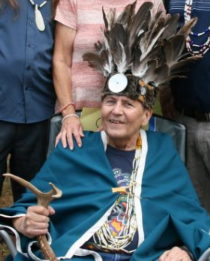The Confederated Tribes of Coos, Lower Umpqua, Siuslaw Tribes are mourning the loss of Chief Donald “Doc” Slyter who walked on this past Saturday, November 4, 2023, after a long battle with cancer. A lifelong resident of the southern coast of Oregon, Chief Slyter served as tribal chairman for various terms. Chief Slyter was 72.

His passing was announced on the Tribes’ website in a statement by his two sons, Tyler and Scott.
“After a long battle, Chief Donald “Doc” Slyter has left this world to rejoin the Creator. He passed at home surrounded by his family.
“His lifelong perseverance, up until the very end, would certainly make our ancestral Warriors proud. Never one to back down or admit defeat, he fought for what he believed was right.”
Brad Kneaper, chair of the Tribal Council said in a statement: “It is with a heavy heart and expressed sadness to learn of the passing of our beloved Chief Doc Slyter. Chief was a great man, a mentor and a friend to me and many others. I have known him for nearly 20 years and since I came to work for the Tribe back in 2004, he always had a word of wisdom for me. I have enjoyed working with him and will miss the talks and interaction as he was very instrumental in our decision-making process.
Chief Slyter’s lifelong dedication and involvement with the Tribe gave him the opportunity to witness the passage of federal legislation in 1984 that federally recognizes the Tribes.
Chief Slyter served as the Chair of the Tribal Council beginning in 1984 until 1987. Later, in April 2015, he was overwhelmingly elected to the Tribal Council. He was elected for a second term in April 2019. In May 2019, he was once again elected as Chairman. He remained in office in that elected position until he decided to run and was elected in April 2020 to serve as Tribal Chief, a position in which he served until his death.
More Stories Like This
Native News Weekly (August 25, 2024): D.C. BriefsNavajo Nation Mourns the Passing of Former Vice President Rex Lee Jim
Deb Haaland Earns Endorsement From Communications Workers of America Local 7076
University Soccer Standout Leads by Example
Two Native Americans Named to Democratic Congressional Campaign Committee's“Red to Blue” Program
Help us defend tribal sovereignty.
At Native News Online, our mission is rooted in telling the stories that strengthen sovereignty and uplift Indigenous voices — not just at year’s end, but every single day.
Because of your generosity last year, we were able to keep our reporters on the ground in tribal communities, at national gatherings and in the halls of Congress — covering the issues that matter most to Indian Country: sovereignty, culture, education, health and economic opportunity.
That support sustained us through a tough year in 2025. Now, as we look to the year ahead, we need your help right now to ensure warrior journalism remains strong — reporting that defends tribal sovereignty, amplifies Native truth, and holds power accountable.
 The stakes couldn't be higher. Your support keeps Native voices heard, Native stories told and Native sovereignty defended.
The stakes couldn't be higher. Your support keeps Native voices heard, Native stories told and Native sovereignty defended.
Stand with Warrior Journalism today.
Levi Rickert (Potawatomi), Editor & Publisher

